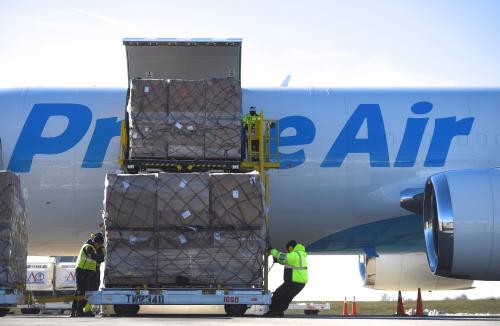On October 19, the Federal Communications Commission (FCC) voted 3-2 to issue a Notice of Proposed Rulemaking (NPRM) to reinstate the agency’s 2015 decision that brought internet service providers (ISPs) under the agency’s jurisdiction as Telecommunications Carriers. This action is necessary because the Trump FCC repealed the previous rule in 2018 at the request of the ISPs. Predictably, the telecom industry and its allies in Congress have come out with guns blazing in opposition to the recent FCC proposal.
Also, predictably, the debate is being mischaracterized around a few tried-and-true buzz phrases that obscure the importance of what is being proposed.
The term “net neutrality” was coined in 2003 by Columbia professor Tim Wu. It was an innovative nomenclature that picked up on the ability of the ISPs to discriminate for their own economic advantage. Net neutrality became commonly described as whether the companies could create “fast lanes” and “slow lanes” for internet traffic. That such a problem was not hypothetical was demonstrated five years later when the Republican FCC fined Comcast for slowing the delivery of video content that could compete with cable channels.
For the longest time, both advocates and opponents of net neutrality have spoken in terms of preventing “blocking, throttling, and paid prioritization” by ISPs. It is, however, a mischaracterization of the policy challenge that cheapens the importance of the real issue: that the nation’s most important network has no public interest supervision.
Mischaracterizing net neutrality as “blocking, throttling, and paid prioritization” also creates an opening for ISPs to proclaim they are now against such practices. “We do not block, slow down or discriminate against lawful content,” Comcast’s web page proclaims. It is interesting to note that “paid prioritization”—the ability to provide a better connection for Netflix, for instance, if it is willing to pay extra for it—has been dropped from the litany of things the company promises never to do.
When I was Chairman of the FCC at the time of the 2015 rules, the ISPs kept saying they would accept a rule that was limited to “blocking, throttling, and paid prioritization.” In support of this position, I was summoned to Capitol Hill by the leaders of the Republican-controlled House and Senate Commerce Committees—the committees with oversight of the FCC. In polite but forceful language, they told me that if the FCC enacted a rule dealing with anything other than “blocking, throttling, and paid prioritization,” they would use their authority to make my life uncomfortable. When the FCC enacted a rule creating broad regulatory authority over ISPs, they kept their promise.
In order to broaden the public’s understanding of the issue beyond what the ISPs wanted to talk about, we tried a new name for the proceeding and the subsequent rule. In place of “net neutrality,” we talked about the “open internet.” It was an effort to remind everyone that open access to essential networks is an age-old proposition.
As far back as England’s emergence from feudalism around 1500, there has been a common law concept that essential services have a “duty to deal.” The operator of the ferry across the river, for instance, could not favor one lord’s traffic over another’s; everyone had access, and everyone had to pay. When the telegraph was introduced in the United States 350 years later, the concept was applied to that new essential service. The Pacific Telegraph Act of 1860 provided, “messages received from any individual, company, or corporation, or from any telegraph lines connecting with this line at either of its termini, shall be impartially transmitted in the order of their reception.” When the telephone came along, the same concept was applied to it as a common carrier.
The Communications Act of 1934, under which the FCC operates today, established in Title II’s statutory language, “It shall be the duty of every common carrier engaged in interstate or foreign communication by wire or radio to furnish such communication service upon reasonable request therefor.” The Communications Act also established the concept that the actions of Title II carriers must be “just and reasonable.” That is the hidden agenda of the ISPs: to be allowed to make their own rules without any review as to whether those actions are “just and reasonable.”
The effort to define the open internet as being about “blocking, throttling, and paid prioritization” is a misleading head fake, a definitional misdirection that allows the ISPs to claim they would never block or throttle while leaving wide open their ability to make their own rules for everything else.
The issue isn’t “net neutrality.” The issue isn’t even about an “open internet.” The issue that is once again before the FCC is whether those that run the most powerful and pervasive platform in the history of the planet will be accountable for behaving in a “just and reasonable” manner.
It is the conduct of the ISPs that is in question here. Because telephone companies were Title II common carriers, their behavior had to be just and reasonable. Those companies prospered under such responsibilities; as they have morphed into wired and wireless ISPs, there is no reasonable argument why they, as well as their new competitors from the cable companies, should not continue to have public interest obligations.
Don’t be misled by the all-too-convenient framing that net neutrality is all about blocking and throttling. The real issue is why such an important pathway on which so many Americans rely should be without a public interest requirement and appropriate oversight.
-
Acknowledgements and disclosures
Comcast is a general, unrestricted donor to the Brookings Institution. The findings, interpretations, and conclusions posted in this piece are solely those of the author and are not influenced by any donation.
The Brookings Institution is committed to quality, independence, and impact.
We are supported by a diverse array of funders. In line with our values and policies, each Brookings publication represents the sole views of its author(s).






Commentary
Don’t be fooled: Net neutrality is about more than just blocking and throttling
October 30, 2023